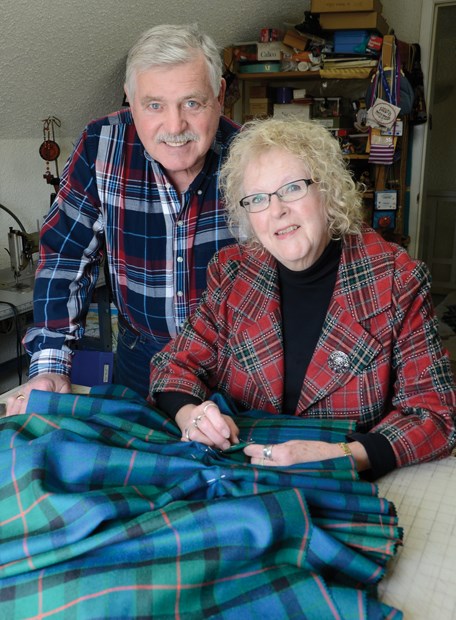How many of us, even of Scottish descent, know that today, April 6, is Tartan Day? As international days go, this one, recognizing Scottish heritage and culture, is relatively young. Nova Scotia was the first province to recognize Tartan Day in 1987, with British Columbia following suit in 1992. Canada made the day official in 2010.
I learned about Tartan Day from transplanted Glaswegian, and ardent supporter of the day, Mae Thomson. A chat about Tartan Day and Scottish culture with Peter Black led to Dal McCrindle, retired minister and piper with the J.P. Fell Pipe Band and his wife, Helen, who makes kilts.
Scottish culture is alive and well at the McCrindle's West Vancouver home, including even their telephone's ringtone, "Scotland the Brave." Upstairs in Helen's workshop, the floor is occupied by a thistlepatterned area rug, and by Annie, the black and tan Gordon setter.
Instead of the expected stacks of tartan fabric, there are sample books. Stock and supplies for this homebased business are handled online. "For each kilt, I order yardage by the piece, directly from the mills in Scotland," Helen explains. The linen-based interfacing that supports the structure, or scaffolding of the kilt, as Helen describes it, is also imported. Buckle straps are made from black dyed cowhide shipped from Winnipeg.
Every kilt, except for the machine-stitched waistband, is made by Helen's own hand. Fringes are hand pulled. Hand-sewn pleats match the design of the sett, the repeating pattern that
identifies the tartan. Each kilt takes between 50 and 60 hours to complete.
When she starts to make a kilt, Helen thinks of Irene Donegan. "Irene was one of the little white-haired ladies who sat in the back of the church, St. Giles Oakridge," Helen remembers. "After three visits and many cups of tea, she allowed me to order the tartan."
During Helen's four-year apprenticeship in the art and craft of kilt making, everyone in her circle of friends and family received their own kilt. The first, made in his clan tartan, MacDonald clan Ranald, went to Dal, to replace the kilt he had when they were posted to Prince Rupert, which appeared to have shrunk, due to the salt water, he insists.
When Helen started making kilts professionally, she was already accomplished with a needle. "It all started with my mother," she says. Helen's mother, whose studies at the Royal School of Needlework in England were interrupted by the Second World War, made sure, "There was always a chest filled with fabric, yarns and embroidery thread to inspire me."
Recently, genealogy, another of Helen's interests, revealed an earlier family link to the needle arts. Her ancestor, Elizabeth Mason, embroidered, on perforated paper, the cover for the journal she kept during her passage from England to Canada in 1842.
Helen's skill and interest in the art and craft of needlework grew as she grew up, took degrees in fine arts and library sciences, moved with her family from Regina to Vancouver, worked as a librarian, met and married Dal and raised a family.
Wherever the McCrindles were posted across western Canada, Helen continued to study, design curricula and teach needle arts; and create designs in her specialty, crewel embroidery, through the Embroiderers' Association of Canada, of which she was an early member and former president.
From 1985, when the McCrindles returned to West Vancouver from their posting in Prince Rupert, she was associated for several years with the Thread Bear in Dundarave, working in sales, teaching smocking and quilting. For about as long as she's been making kilts, 15 years, Helen has been working with Westminster Abbey in Mission, restoring the abbey's collection of liturgical vestments.
Helen's passion for needle arts led to the paths of artist, educator and entrepreneur. Her kilts are marvels of precision, the artistry evident in meticulous attention to detail. Her colour sense, a genetic legacy, and her creativity, which connects all art with the spirit, are expressed through embroidery.
Helen's newest creation blends culture and spirit. In recognition of Tartan Day, the church mouse puppet, familiar to the younger members of the congregation at West Vancouver United Church, will appear at today's service in a kilt, handmade by Helen McCrindle.
Laura Anderson works with and for seniors on the North Shore. 778-279-2275 [email protected]



